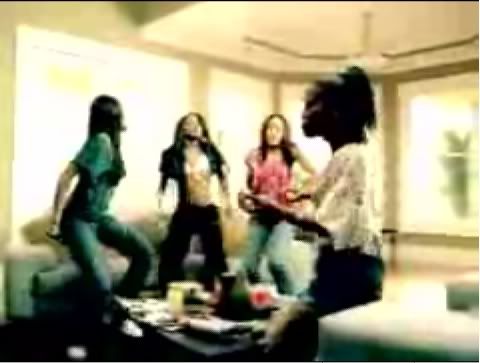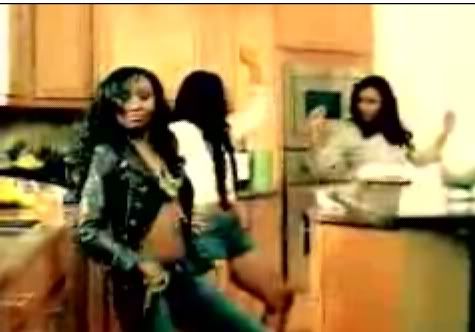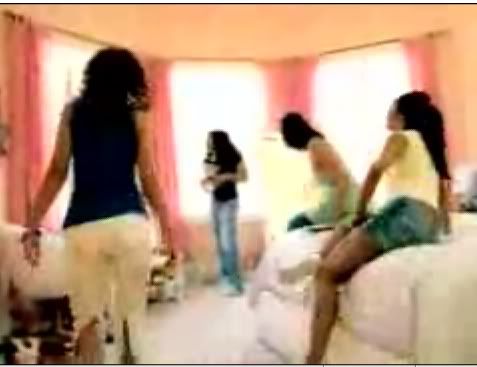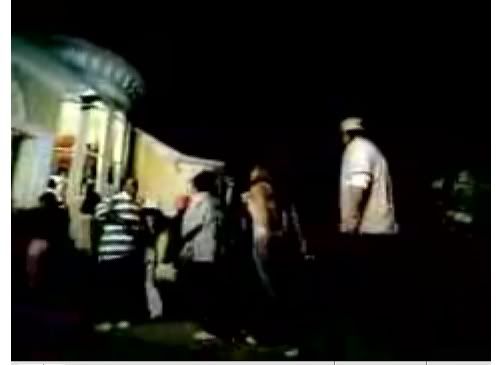hip-hop hits the suburbs
The Cherish girls can sing. And dance. And, to boot, they have money. Just watch:
Fun times, right? It's like a big constant dance party, with lots of attractive teenagers, nice furniture, in a really shiny, big house. But let's take a closer look at where all this feel-good, danceriffic fun taking place: the 'Burbs. The Suburbs. The Sub-fucking-burbs, that white-picket-fenced wasteland, that wilderness of McMansions, those cul-de-sac-consumed miles of houses.
Take a look at some of the moments I captured from the video:




These girls are obviously well-off. The Cherish crew is not hurting financially, in fact, they are coasting very nicely socio-economically as far as we can tell. They are blatantly suburbians, yet, as is so evident in this video, they are clinging tightly to their urban roots. The lyrics say it all:
We from the city that make it Okay to/
To make clubbin' a year-round holiday
No need to ask where I'm from/
You already know/
I represent the A from my head to my toes.
They're "from the city"? But the Cherish Crew isn't from the city-- isn't this their house in suburbia? Yet the tug between urban roots and suburban reality is strong, and it influences dress, language and even where one says they are from-- witness the Cherish confidence of this: "No need to ask where I'm from you already know."
But such a statement is really the opposite. As I read in my (super-fascinating!) American Studies class from Andrew Weise, the tug for Black suburbanites between city-roots and suburban living is tough to negotiate. How does class interfere with what one percieves your "culture" to be?
For example, the Cherish chicas have surely been educated with knowledge and proficiency of Standard English (ex: "that makes it okay" vs. the song lyrics "that make[no "s"] it okay") to know how to properly use that conjugation. But the Black English of the inner-city often tug young Black Suburbanites to drop the 's' in their speech. To which I ask: how much of retaining one's "roots" is hindering "progress" in the "mainstream" society?
I don't know if the Cherish girls usually say "make" versus "makes" (or other aspects of the third-person-s conjugation), and, after writing a 20 (!) page Linguistics paper on the subject, I'm more than well-aware of the origins of Ebonics or "Black English" (FYI: African slaves developed a "Creole," or a hybrid language, that became the Ebonics we know of today but have severely and mistakenly stigmatized). But this stigma is true, and is a matter-of-fact that to "get ahead," at least in the conventional terms, you need to have mastery of Standard English. Is the tug towards inner-city speech confounding with the progress of "making it" to the suburbs, as in the case of where Cherish is filming their video?
All in all, I personally do not have the answers. I can observe what I see to be a "tug" going on for the Cherish girls and their cronies in this video: urban ways of dressing, speaking and identifying oneself stuck in suburbia--or, not stuck in suburbia, but located contently in suburbia. Urban culture has a new address. What does this mean?
Fun times, right? It's like a big constant dance party, with lots of attractive teenagers, nice furniture, in a really shiny, big house. But let's take a closer look at where all this feel-good, danceriffic fun taking place: the 'Burbs. The Suburbs. The Sub-fucking-burbs, that white-picket-fenced wasteland, that wilderness of McMansions, those cul-de-sac-consumed miles of houses.
Take a look at some of the moments I captured from the video:




These girls are obviously well-off. The Cherish crew is not hurting financially, in fact, they are coasting very nicely socio-economically as far as we can tell. They are blatantly suburbians, yet, as is so evident in this video, they are clinging tightly to their urban roots. The lyrics say it all:
We from the city that make it Okay to/
To make clubbin' a year-round holiday
No need to ask where I'm from/
You already know/
I represent the A from my head to my toes.
They're "from the city"? But the Cherish Crew isn't from the city-- isn't this their house in suburbia? Yet the tug between urban roots and suburban reality is strong, and it influences dress, language and even where one says they are from-- witness the Cherish confidence of this: "No need to ask where I'm from you already know."
But such a statement is really the opposite. As I read in my (super-fascinating!) American Studies class from Andrew Weise, the tug for Black suburbanites between city-roots and suburban living is tough to negotiate. How does class interfere with what one percieves your "culture" to be?
For example, the Cherish chicas have surely been educated with knowledge and proficiency of Standard English (ex: "that makes it okay" vs. the song lyrics "that make[no "s"] it okay") to know how to properly use that conjugation. But the Black English of the inner-city often tug young Black Suburbanites to drop the 's' in their speech. To which I ask: how much of retaining one's "roots" is hindering "progress" in the "mainstream" society?
I don't know if the Cherish girls usually say "make" versus "makes" (or other aspects of the third-person-s conjugation), and, after writing a 20 (!) page Linguistics paper on the subject, I'm more than well-aware of the origins of Ebonics or "Black English" (FYI: African slaves developed a "Creole," or a hybrid language, that became the Ebonics we know of today but have severely and mistakenly stigmatized). But this stigma is true, and is a matter-of-fact that to "get ahead," at least in the conventional terms, you need to have mastery of Standard English. Is the tug towards inner-city speech confounding with the progress of "making it" to the suburbs, as in the case of where Cherish is filming their video?
All in all, I personally do not have the answers. I can observe what I see to be a "tug" going on for the Cherish girls and their cronies in this video: urban ways of dressing, speaking and identifying oneself stuck in suburbia--or, not stuck in suburbia, but located contently in suburbia. Urban culture has a new address. What does this mean?